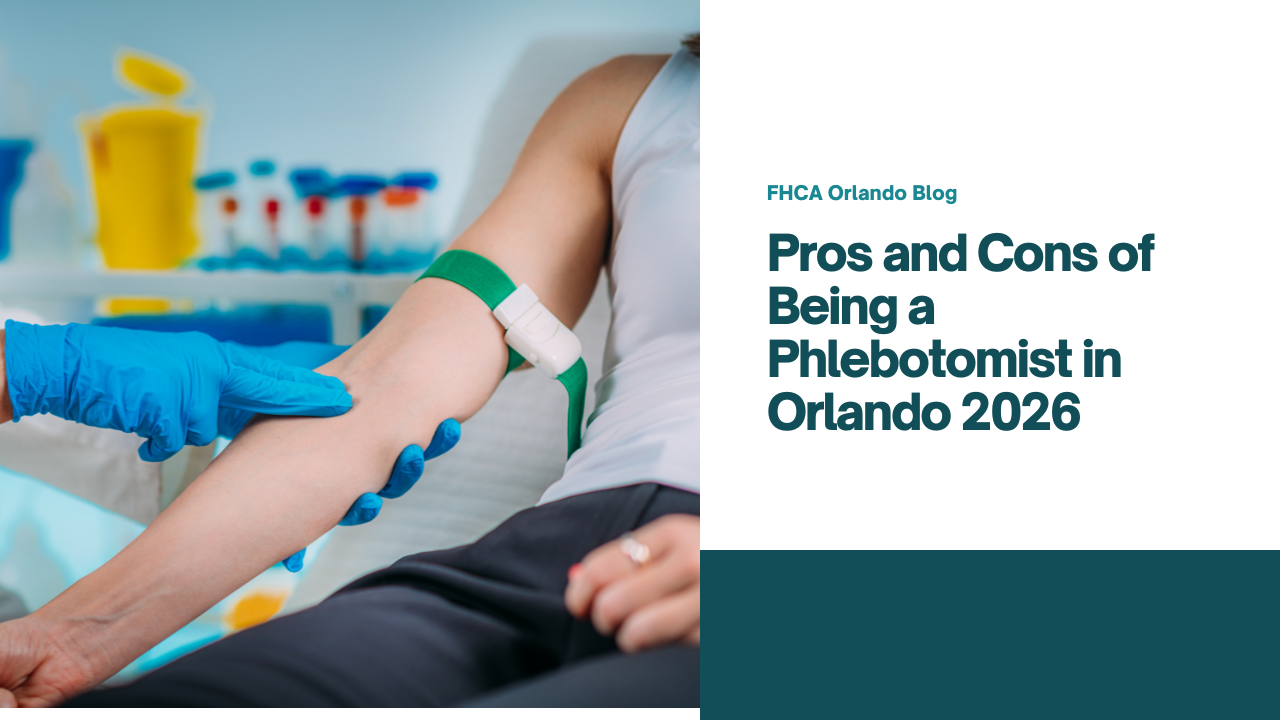Top 8 Qualities of a successful medical assistant
Oct 30, 2025
Becoming a standout medical assistant goes beyond mastering procedures, it’s about bringing the right mindset, attitude, and interpersonal skills into every patient interaction and clinical task. From empathy to attention to detail, these qualities define how effectively you can support patients and healthcare teams. At FHCA Orlando, we help you develop these traits from day one.
Table of Contents
- Why Qualities Make a Difference in Patient Care
- Key qualities every medical assistant should have
- How to develop these qualities during training
- Qualities of a medical assistant FAQs
- Start building the qualities that set you apart
Why qualities make a difference in patient care
In clinical settings, success isn’t just measured by technical skills, it’s also about how patients feel during and after their visit. When you bring strong communication, empathy, and professionalism to your work, you create a more welcoming, efficient, and safe environment.
These qualities not only support physicians and nurses, but also help build patient trust, reduce anxiety, and improve overall satisfaction. That’s why knowing what to expect as a medical assistant is crucial before entering the field.
Key qualities every medical assistant should have
We know that success as a medical assistant depends on more than just technical skills. Your role bridges patient interaction, clinical care, and administrative precision. Personal traits and soft skills are just as important as certifications, and we help you cultivate them during training. Understanding what you learn as a medical assistant helps you see how these qualities are developed during training.
1. Communication with patients and teams
You’ll serve as a link between patients and clinical staff. Being able to speak clearly, listen actively, and explain procedures with patience helps patients feel secure and informed. It also keeps the healthcare team coordinated and reduces errors or delays.
2. Empathy in difficult situations
Empathy is more than kindness, it’s understanding a patient’s emotional state and responding thoughtfully. Whether you’re calming an anxious patient or comforting someone in pain, showing genuine compassion builds trust and improves the care experience.
3. Attention to clinical & administrative detail
Every chart entry, medication dosage, or insurance code matters. Paying close attention to detail in both paperwork and patient care helps prevent errors and delays, which is essential in any healthcare setting.
This is especially true in specialized roles like an ophthalmology medical assistant, where accurate vision tests, documentation, and patient prep are critical to eye care.
4. Organization in daily tasks
Medical assistants juggle multiple responsibilities, from prepping exam rooms and updating charts to managing schedules and assisting with procedures. Staying organized and prioritizing tasks helps maintain workflow, efficiency, and patient safety.
5. Adaptability in fast-paced settings
No two days are ever the same in healthcare. From last-minute schedule changes to urgent clinical needs, being adaptable helps you stay calm, effective, and ready to support your team.
6. Professionalism & ethical behavior
You’ll handle private health information, interact with diverse patient populations, and represent your clinic. Integrity, respect, punctuality, and adherence to HIPAA standards are essential to earning the trust of both patients and coworkers.
7. Technical confidence with medical tools
We make sure you feel confident using tools like vital sign monitors, EKG machines, and phlebotomy supplies. Competence with clinical equipment boosts efficiency, patient safety, and confidence in your care.
8. Collaboration with nurses & physicians
Great medical assistants are team players. Anticipating the needs of nurses and physicians, communicating clearly, and understanding each team member’s role helps support smooth patient flow and seamless care.

How to develop these qualities during training
Developing these skills takes more than classroom instruction. At FHCA Orlando, we combine hands-on practice, mentorship, and real patient scenarios so you can apply communication, empathy, and professionalism in real time. FHCA’s program outlines the medical assistant program requirements that guide this development.
Learning through real‑world experience
Hands-on clinical experience is where these skills really come to life. Through simulated patient interactions, supervised rotations, and role-playing exercises, you’ll practice managing emotions, thinking on your feet, and communicating effectively under pressure.
How FHCA Orlando builds patient‑ready professionals
We focus on more than technical training—we prepare you to succeed in real clinical settings. With expert guidance and hands-on experience, you’ll build confidence, communication skills, and professionalism from day one. If you’re planning your path, understanding how long a medical assistant program is helps you know what to expect.
Qualities of a medical assistant FAQs
Curious about what it really takes to thrive as a medical assistant? These frequently asked questions clarify the traits, skills, and development process behind success in this role.
What are the top qualities for a medical assistant?
Communication, empathy, organization, attention to detail, and professionalism are essential traits that help you deliver excellent patient care and support your team.
How can communication skills influence your performance?
Clear communication builds trust with patients and improves coordination with your healthcare team, reducing errors and misunderstandings.
Why is empathy essential in healthcare?
Empathy helps you connect with patients, improving comfort and trust during stressful or vulnerable moments.
What technical skills complement these qualities?
Skills like taking vitals, administering injections, and using electronic health records help you deliver accurate, complete care.
Can these qualities be developed in school?
Our programs combine classroom instruction with real-life practice so you can develop these skills before entering the workforce.
Start building the qualities that set you apart
At FHCA Orlando, our medical assistant program 2026 is designed to strengthen your clinical skills and professional traits from day one. You’ll gain the confidence and hands-on experience you need to thrive in a patient-centered healthcare career.
Ready to take the next step? Enroll today, and begin your journey toward becoming a skilled, compassionate, and confident medical assistant.








